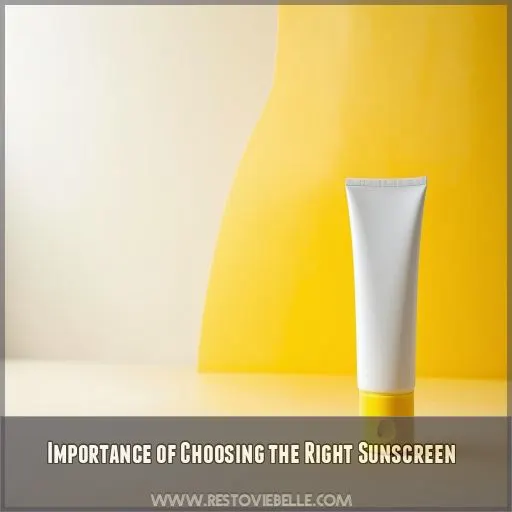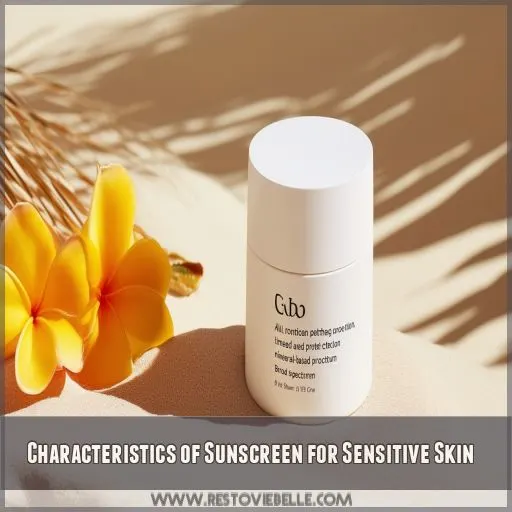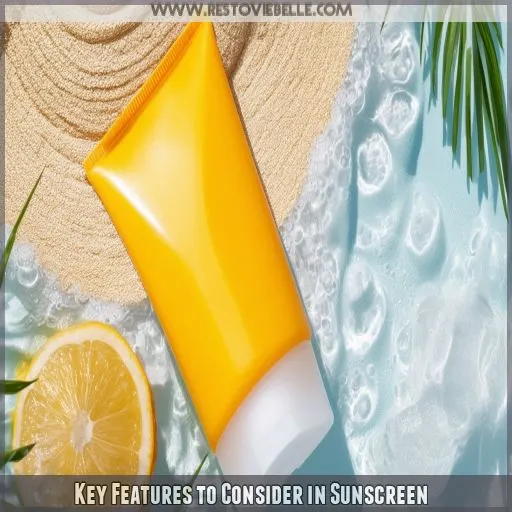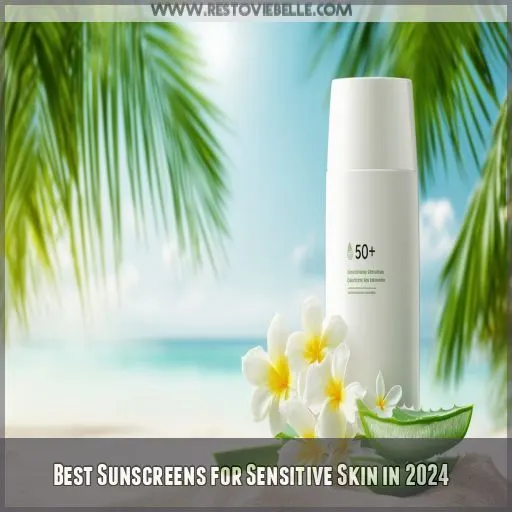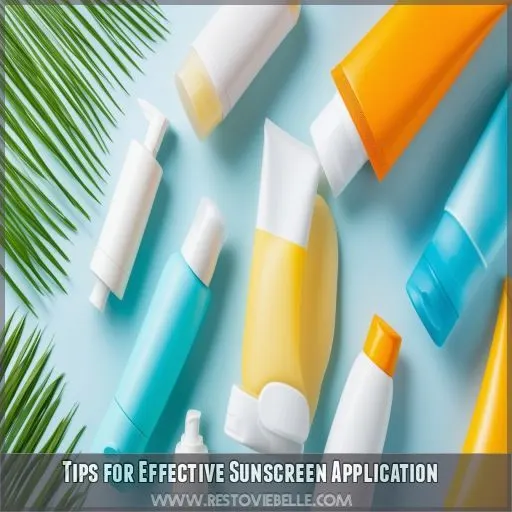This site is supported by our readers. We may earn a commission, at no cost to you, if you purchase through links.
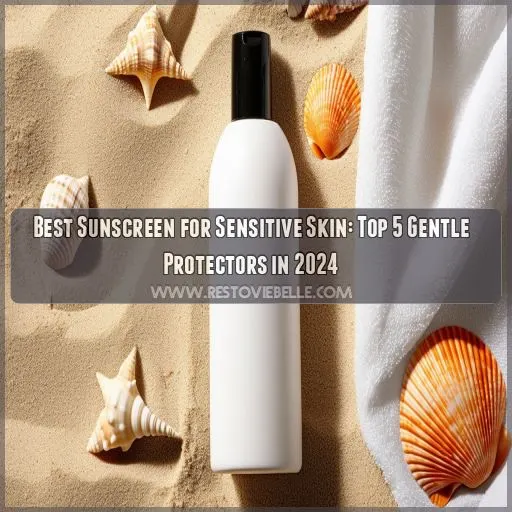
Different brands in 2024 come up with great formulas designed for even the most delicate skin. The following article will look at the top 5 gentle protectors—a shield for your skin from hazardous UV rays while keeping sensitivity in mind.
You’ll learn how to seek out the right one and how to apply sunscreen effectively in protecting your skin all year long, so that you can stay comfortable.
Table Of Contents
Key Takeaways
- Mineral sunscreens are your sensitive skin’s BFF – they’re like tiny mirrors reflecting those pesky UV rays away. No more playing "dodge the sunburn"!
- Don’t skimp on the SPF, but remember – higher isn’t always better. It’s like coffee; more doesn’t always mean more productive, just more jittery (or in this case, potentially irritated).
- Reapplication is key, even when you’re pulling a vampire and hiding indoors. Those sneaky UV rays can find you through windows, so keep slathering on that sunscreen like it’s your favorite jam.
- When it comes to sensitive skin, less is more. Go for fragrance-free, non-comedogenic options. Think of it as a capsule wardrobe for your face – simple, effective, and won’t cause a fashion (or skin) crisis.
Importance of Choosing the Right Sunscreen
The right sunscreen is important for sensitive skin, so it doesn’t suffer from these dangerous UV radiations while it’s protected from irritation. If you go for a suitable formula, you shan’t only be protecting from sunburns and damages to the skin, but its use will also reduce the risk of long-standing health problems like premature aging and skin cancer.
Skin Protection Benefits
Choosing the right sunscreen for your sensitive skin isn’t just about avoiding irritation—it’s a shield against harmful UV rays. By absorbing UV radiation, sunscreen protects your skin barrier and reduces photoaging.
While it limits vitamin D production, the anti-aging effects are significant. You’ll preserve your skin’s health and youthful appearance, keeping wrinkles and sun spots at bay.
It’s like giving your skin a daily dose of protection and care.
Irritation Prevention Factors
Not only do you protect against UV rays when choosing a sunscreen for sensitive skin, but you also avoid the irritation that may result from it.
Be sure to choose formulas that are pro-prevention in allergies, with a focus on chemical safety and natural ingredients. The absorption of sunscreen by your skin is important as well.
Choosing the right sunscreen will ensure that UV protection works without turning your skin red or causing itching or breakouts. It’s a win-win on both fronts: skin health and comfort.
Long-Term Health Implications
Choosing the right sunscreen doesn’t just save you from sunburn; it’s an investment in long-term health. The right sunscreen, applied on a regular basis, will save you from most skin cancers and premature aging.
Protection isn’t the whole story, though—you will need some sun for vitamin D production. Sunscreen will also help avoid damage to your immune system and vision, which will have you looking and feeling good for years to come.
Characteristics of Sunscreen for Sensitive Skin
When choosing sunscreen for sensitive skin, you’ll want to focus on three key characteristics: mineral-based formulas, non-comedogenic ingredients, and fragrance-free options. These features help minimize irritation and reduce the risk of clogged pores, making them ideal for those with delicate or reactive skin types.
Mineral Sunscreens
When choosing sunscreen for sensitive skin, mineral options are your best bet. Unlike chemical sunscreens, mineral sunscreens use zinc oxide or titanium dioxide as physical filters.
These sit on top of your skin, reflecting UV rays like tiny mirrors. They provide broad-spectrum protection against both UVA and UVB rays, reducing your risk of sunburn and long-term skin damage.
Plus, they’re less likely to cause irritation, making them ideal for delicate skin.
Non-Comedogenic Formulas
Non-comedogenic formulas are suitable for sensitive skin when choosing the best sunscreen. These oil-free options won’t clog pores or cause breakouts.
The finish is very sheer and matte, blending into your skin flawlessly.
Applying non-comedogenic sunscreens onto your skin won’t only protect it from harmful UV rays but also enhance its clarity and health—a win-win for your complexion!
Fragrance-Free Options
When you’re dealing with sensitive skin, fragrance-free sunscreens are your best bet.
These hypoallergenic formulations steer clear of chemical filters and oxybenzone, which can trigger reactions. Instead, they often use zinc oxide alternatives for gentler protection.
Look for paraben-free choices to further reduce irritation risks.
Key Features to Consider in Sunscreen
Looking at any sunscreen with sensitive skin in mind, there are three major features that you’ll want to look for: the SPF rating, protection against both UVA and UVB sun rays, and how water-resistant it is. These guarantee you very good protection from the sun while minimizing the risk of irritation or allergic reactions.
SPF Rating
When choosing a sunscreen for sensitive skin, you’ll want to focus on the Sun Protection Factor (SPF). It’s your shield against UV radiation and sunburn. Higher SPF numbers offer more protection, but don’t be fooled – SPF 30 blocks 97% of rays, while SPF 50 blocks 98%. For daily use, aim for at least SPF 30. Remember, reapplication is key to maintaining that protective barrier!
Broad-Spectrum Protection
You’ll want to look for broad-spectrum sunscreen. This very important feature will help your skin be protected against UVA and UVB rays.
UVA goes more deeply into the skin, resulting in premature aging, and the UVB rays are responsible for sunburn.
Broad-spectrum sunscreen acts as a barrier to allow skin protection and DNA repair. These features shouldn’t be skimped on—it’s your best insurance against the adverse effects of the sun on your skin.
Water-Resistance
While broad-spectrum protection shields you from harmful rays, water resistance ensures that your sunscreen doesn’t get washed off. Look for products that have been labeled "water-resistant" or "very water-resistant," designed to protect skin for either 40 or 80 minutes of exposure to the water.
Here’s the thing: No sunscreen is waterproof. Zinc oxide-based formulas often boast great water resistance—so don’t think you’re off the hook to reapply after a swim, sweat, or towel-off.
Best Sunscreens for Sensitive Skin in 2024
After exploring the key features of sunscreen for sensitive skin, let’s look at the top recommendations for 2024. These carefully selected products offer gentle protection while addressing the unique needs of sensitive skin types.
Recommendation 1
For sensitive skin prone to irritation, EltaMD UV Clear Facial Sunscreen is a top choice. It’s formulated with zinc oxide, offering broad-spectrum protection without causing chemical reactions. This SPF 46 sunscreen is perfect for sun sensitivity and sunburn prevention. Its lightweight, oil-free formula won’t clog pores, promoting overall skin health. You’ll love how it absorbs quickly, leaving no white cast behind.
Recommendation 2
Our next pick is a hypoallergenic sunscreen that’s perfect for sensitive skin types. It’s packed with natural ingredients and has undergone rigorous allergy testing to minimize skin reactions. You’ll love its gentle formula, which:
- Soothes like a cool breeze on a hot day
- Glides on smoothly, leaving no white cast
- Hydrates your skin without feeling greasy
- Protects against harmful UV rays invisibly
This sunscreen is your skin’s new best friend, offering peace of mind and reliable protection.
Recommendation 3
If you’re looking to provide your skin with protection by means of a hypoallergenic and non-greasy mineral sunscreen, look no further than SunSafe Mineral Shield.
It contains a reef-friendly formula—a non-heavy broad spectrum that’s perfect for daily use. With its zinc oxide base, it provides very good coverage while having anti-aging properties.
Just fall in love with the way it flows so easily into your skin and doesn’t leave behind that white cast—it’s a win-win for sensitive skin and the environment!
Recommendation 4
Looking for a sunscreen that’s gentle on sensitive skin? Try the EcoShield Sensitive Skin SPF 50. This chemical-free formula offers robust SPF protection without causing skin irritation. Packed with aloe vera extract, it soothes while shielding you from harmful rays.
Key features:
- Mineral-based, reef-safe formula
- Non-greasy, fast-absorbing texture
- Fragrance-free and hypoallergenic
- Water-resistant for up to 80 minutes
EcoShield’s sunscreen is your go-to for sunburn prevention and all-day comfort.
Recommendation 5
Rounding out our top picks is a vegan option that’s perfect for those with skin allergies.
This sunscreen uses physical blockers like zinc oxide instead of chemical filters, making it gentle on sensitive skin. It’s free from common irritants and offers broad-spectrum protection.
You’ll love how it feels lightweight and doesn’t leave a white cast, making it ideal for daily use.
Tips for Effective Sunscreen Application
Now that you have the perfect sensitive skin sunscreen, how you apply it’s everything. Here are some expert tips to make sure you get the most out of your gentle protector:
- Apply generously: Use about a shot glass worth of sunscreen to your whole body.
Don’t forget often-missed spots: ears, back of neck, tops of feet, and scalp (if exposed).
• Reapply every 2 hours or after swimming/sweating.
• Use daily, even on cloudy days or when indoors near windows.
Frequently Asked Questions (FAQs)
Can sunscreen cause acne or skin irritation?
Yes, sunscreen can potentially cause acne or skin irritation, especially if you’ve got sensitive skin. You’ll want to choose non-comedogenic, fragrance-free options and patch test before full application. If problems persist, consult a dermatologist for personalized advice.
How often should sunscreen be reapplied indoors?
Slather on more sunscreen every 2 hours when staying indoors, more often if you’re near the windows. You see, glass filters in a good majority of UV radiation right inside. So don’t be caught off guard; keep protecting your skin throughout the day to ensure maximum protection.
Is higher SPF always better for sensitive skin?
Did you know 80% of UV rays can penetrate clouds? Higher SPF isn’t always better for sensitive skin. While it offers more protection, it often contains more chemicals. You’ll want to balance SPF level with gentle, hypoallergenic ingredients.
Can makeup be worn over sunscreen for sensitive skin?
Yes, you can wear makeup over sunscreen for sensitive skin. Apply your sunscreen first, let it absorb for a few minutes, then apply makeup. Choose non-comedogenic products to avoid clogging pores and irritating your delicate skin.
Are natural or mineral sunscreens more effective for sensitivity?
You’ve been searching for the perfect sunscreen forever! Mineral sunscreens are generally more effective for sensitive skin. They sit on top of your skin, creating a physical barrier. Natural ingredients can still cause irritation, so always patch test first.
Conclusion
Luckily, finding the right sunscreen for sensitive skin need not be quite a task anymore. You now have the knowledge to pick a gentle protector that will shield your delicate skin from the very harmful UV rays.
Remember to look for mineral-based or fragrance-free formulas with broad-spectrum protection. Apply the chosen sunscreen liberally and as often as necessary for full protection.
With these tips and top picks, you’re all set for protecting your sensitive skin and staying comfortable throughout the year. Don’t let sun sensitivity stop you from enjoying the outdoors.

